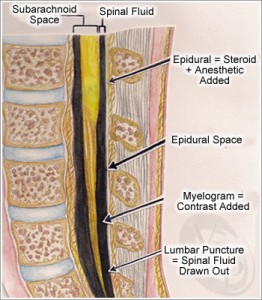Cervical, Lumbar, Thoracic, Translaminar or Transforaminal/Nerve Root Block
Epidural injections of steroids is a common procedure to help conservatively treat various conditions of the low back, thoracic region and neck. “Epidural” refers to the space around the spinal canal from the skull down to the sacrum. Steroid medications injected into this space decrease swelling and inflammation.
A routine epidural whether it is cervical, thoracic or lumbar is performed posteriorly near the midline. The medication is placed as close as possible to the level of pathology (spinal stenosis or herniated disc).
This is sometimes referred to a translaminar epidural and treats both sides of the spine. Another method of injecting the same medications is called a transforaminal epidural steroid injection(TFESI). The space in the spine is similar but the medication is more concentrated on one level and treats only one side. Whereas a translaminar epidural treats multiple levels and both sides. A TFESI (or nerve root block) may be used as a diagnostic procedure to localize the source of pain and also treat that area at the same time.
Preparing for your epidural injection:
- A representative will contact you prior to your appointment to review your medications and complete registration.
- Be sure to let your doctor know if you are taking blood thinners (Aspirin, Lovenox, Plavix, Heparin, or Coumadin). You MAY be asked to stop this medication 5 days before your procedure. You may resume the medication the day after your procedure.
- You will need to arrange for a driver to take you home.
- The procedure requires injection with contrast dye, local anesthetic and steroid. If you have an allergy to any of these medications please notify our representative, scheduler, or nurse as soon as possible.
- Nothing to eat or drink 4 hours prior to your appointment time for cervical procedures or 2 hours prior to your appointment time for lumbar and thoracic procedures.
- You may experience some soreness at the injection site for up to 24 hours. This can be managed with over the counter analgesics such as ibuprofen or aspirin. Cold ice packs 3-4 times daily for several days are also effective. You may take your own pain medication if it is already prescribed by your referring physician.
- You can return to light activity the day of your procedure and avoid strenuous activity or physical therapy for the next 3 days.
If you develop fever or severe pain contact our office at 352-333-7847 (7VIP) or call your referring physician. After hours or on weekends, go to the nearest emergency room or call North Florida Regional Medical Center at 352-333-4000 and ask for the Radiologist on call.


